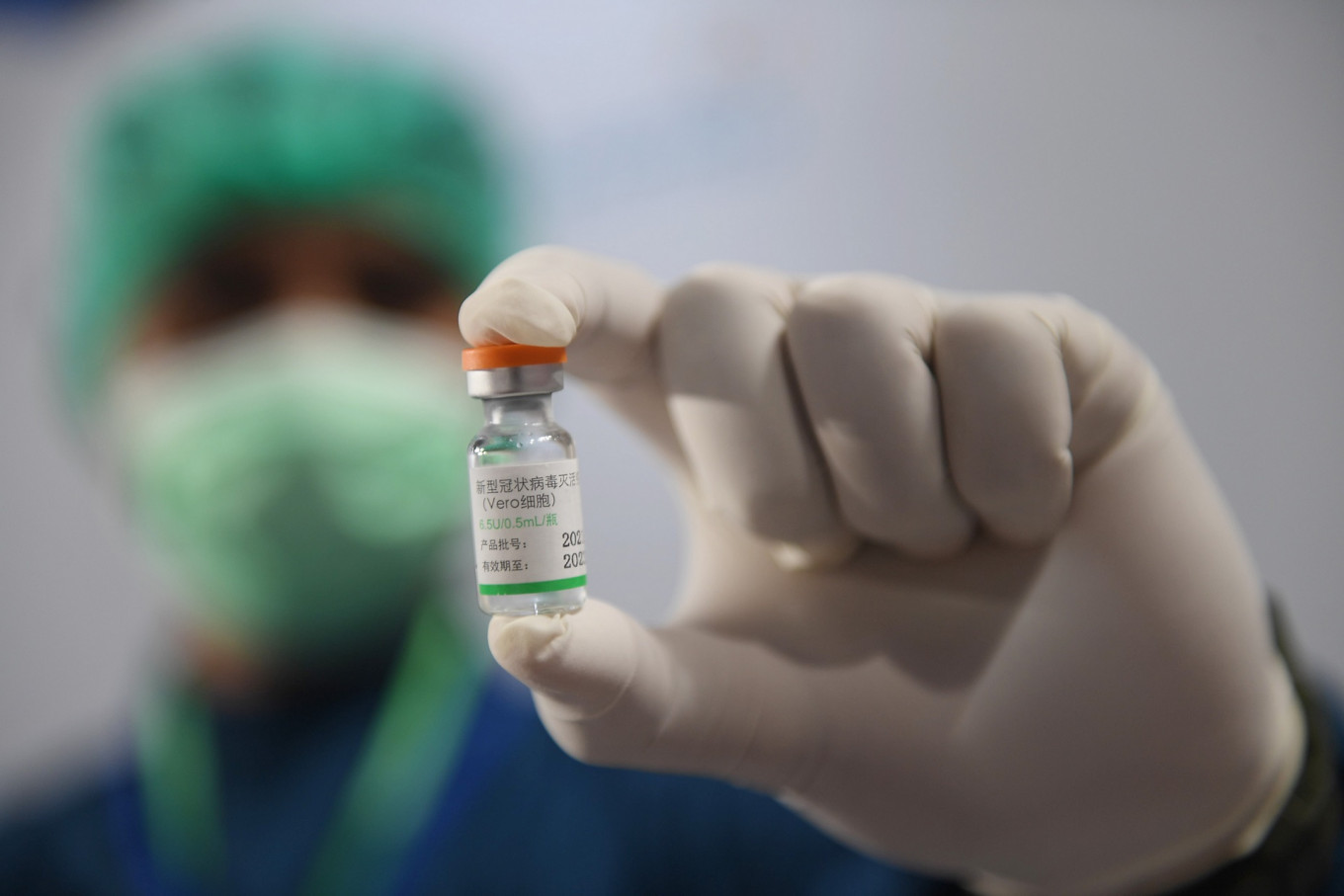Popular Reads
Top Results
Can't find what you're looking for?
View all search resultsPopular Reads
Top Results
Can't find what you're looking for?
View all search resultsSelf-paid vaccine plan sparks anger
Kimia Farma decides to delay private COVID-19 vaccination drive indefinitely
Change text size
Gift Premium Articles
to Anyone
T
he latest plan to launch a privately paid vaccination program has been met with anger by critics who claim the government is attempting to reap profits from the pandemic.
On Sunday, state-owned pharmaceutical company PT Kimia Farma announced it would offer a privately paid vaccination program at eight clinics in six cities in Java and Bali as part of the Gotong Royong private vaccination scheme.
According to the company, the service is offered to anyone willing to pay Rp 879,000 (US$60) for two doses of the COVID-19 vaccine produced by state-backed China National Pharmaceutical Group (Sinopharm).
The self-paid vaccination program was made possible after the government revised the Gotong Royong scheme last week in a revision to a Health Ministry regulation. The new policy, however, was only made known to the public on Sunday.
Initially, the Gotong Royong scheme had only allowed private and state-owned companies to buy vaccine supplies from the government for distribution to employees and their family members free of charge.
Read also: Private vaccination scheme begins at Jababeka
Kimia Farma said the firm was not looking for financial benefit from the privately paid inoculation program. The firm's acting president director Agus Chandra said on Sunday that the company was aiming to support the government’s efforts to vaccinate the public, as there was a demand for self-paid individual vaccination.
Critics immediately slammed the program, arguing the government was “constitutionally obligated” to ensure that every citizen gets a COVID-19 vaccine for free.
“[This regulation] means that people’s health and lives in the country during this pandemic will be determined by their wealth,” independent tracking site LaporCovid-19 cofounder Irma Hidayana said on Sunday. “Don’t let the government’s failure to accelerate vaccination be used as an excuse to garner profits.”
She called for the government to drop the scheme and instead focus on fixing issues pertaining to the government’s free and public vaccination drive.
Breaking promises
Irma and other critics said the self-paid program stood in stark contrast to a promise made by President Joko “Jokowi” Widodo last year that all people would receive COVID-19 vaccines free of charge.
The promise had been included in the earlier version of the Health Ministry regulation regarding the national vaccination program issued last year.
But the government introduced in March the Gotong Royong scheme that allowed private firms to buy vaccines from the government, which raised concerns from critics that it would disrupt the country’s entire vaccination program.
Indonesia initially targeted administering vaccines to around 181 million people to help the country reach herd immunity against COVID-19. But the target was recently expanded to around 200 million as health authorities looked to vaccinate children between 12 and 17 years old.
Read also: For the benefit of all, COVID-19 vaccination must not be for the few
Rizky Argama of the Center for Law and Policy Studies (PSHK) said the self-paid vaccination program was contrary to the principle that COVID-19 vaccines should be distributed as public goods.
He added that the ever-changing regulations on vaccination in the country showed that the government lacked a clear plan. Rizky went on to allege that the latest regulation was issued without proper studies.
“It seems that the dominant nature of the regulation is profit-seeking rather than a policy based on scientific evidence,” Rizky said.
Legal and human rights group Lokataru Foundation executive director Haris Azhar called the self-paid scheme “a health and governance crisis”, urging the government to focus on ensuring equal access for the vaccine.
“This is an abuse of power with [the government] using its authority to make money amid a crisis,” Haris said on Monday.
Delayed indefinitely
Following the criticism of the program, Kimia Farma announced on Monday that the company had decided to delay the privately paid vaccination drive indefinitely.
“We’re very sorry to announce that the vaccination program, initially set to start on July 12, is delayed until further notice,” Kimia Farma corporate secretary Ganti Winarno wrote in a statement on Monday.
He did not mention the public criticism but cited the “high enthusiasm and many questions” the company had received as the reasons for the delay.
“The management has decided to prolong the time to raise public awareness about the Gotong Royong individual vaccination scheme and to organize the registration process for recipients,” the statement read.
Read also: Indonesia scales up vaccine deals, rollout amid devastating 'second wave'
Despite the postponement, Coordinating Economic Minister Airlangga Hartarto announced the government’s support for the privately paid Gotong Royong scheme. He said it would help the government achieve its target of 1.5 million daily vaccinations this month.
The minister said around 99.5 million doses of COVID-19 vaccines would be available this month — 4.5 million of which are set to be allocated for the Gotong Royong scheme.
Health Minister Budi Gunadi Sadikin echoed Airlangga, saying the self-paid scheme would be an option for those who have yet to find access to vaccines from private and state-owned firms participating in the Gotong Royong scheme.
He insisted the privately paid scheme would not disrupt the vaccine quota for the government’s national vaccination program, as vaccines had started to arrive in the country in massive amounts.










